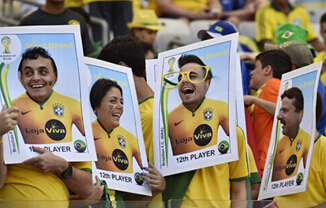
A poll published Sunday on the wealth and race of fans who attended a World Cup match in Brazil illustrated what any TV viewer in the nation has seen: Those attending games are overwhelmingly white and rich.
That's particularly striking in Brazil, with its highly mixed population that has more blacks than any country with the exception of Nigeria. More than half of Brazil's population self-identified themselves as black or of mixed-race in the 2010 census.
A Datafolha polling group survey published in the Folha de S. Paulo newspaper showed that at Saturday's Brazil versus Chile match, 67 percent of attendees classified themselves as white and 90 percent came from Brazil's top two economic classes, which represent about 15 percent of the country's population.
Similar trends have been seen at other Cup matches, though no polls were carried out previously.
The Datafolha poll was based on interviews with 693 fans at the Mineirao stadium in Belo Horizonte and had a statistical margin of error of 4 percentage points.
"Sure, there are only whites in the stadium. It comes down to money," said Ana Beatriz Ferreira, a 27-year-old parking attendant in Rio de Janeiro, who is black. "Nobody I know could find affordable tickets."
That's become a common refrain in Brazil - where the billions spent to build new or upgrade existing football stadiums both raised public ire about how the money was spent and has already caused ticket prices for Brazilian national soccer league matches to rise sharply. Some fans complain that's turned what were once affordable, raucous stadium experiences in Brazil into more costly and less spontaneous visits to storied stadiums like Rio's Maracana.
Ferreira added that while the entire Brazilian population has suffered during preparations for the World Cup, mostly because of big construction projects that have snarled traffic and extended already long commutes for the poor who live on the outskirts of cities, she feels like only the rich are reaping the benefits of the real World Cup experience.
"All I got was an extra hour on the bus to work, but I can't get a seat at the stadium," she said as she directed cars toward a mall's parking garage in Rio's wealthy southern zone.
Face-value prices for the Brazil versus Chile match officially ranged from $200 to $25 for Brazilians, the cheapest tickets making up roughly 5 percent of those sold. They were only available for students, senior citizens or poor people who participate in a government welfare program.
The prices are tough for ordinary Brazilians to afford. The minimum wage in the country is $330 a month, just about what Ferreira said she earns.
In an emailed statement, FIFA said that during group stage matches, it sold a total of 143,364 of the cheapest tickets, which amounted to roughly 3,000 such tickets available per match.
Those quickly sold out, locking out the vast majority of fans in soccer-mad Brazil.
Marcos Carvalho, an 18-year-old Brazilian fan who was hanging out near the Estadio Nacional in Brasilia before Brazil played Cameroon earlier this week, said that he "didn't even try getting tickets, they were too expensive.""There was no way we could afford them," he said. "We'll just watch the match at home, it's all we can do. We are seeing everyone going to the stadium, everyone happy, but we won't be going."












